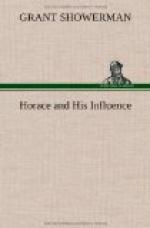Integer vitae
scelerisque purus
Non eget Mauri
jaculis nec arcu.
Chiron.
O_, ’tis a verse in Horace; I know
it well_:
I_ read it in the grammar long ago_.
The mere mention of English authors in poetry and prose who were touched and kindled by the Horatian flame would amount to a review of the whole course of English literature. It would begin principally with Spenser and Ben Jonson, who in some measure represented in their land what the Pleiad meant in France, and Opitz and his following in Germany. “Steep yourselves in the classics,” was Jonson’s counsel, and his countrymen did thus steep themselves to such a degree that it is possible for the student to say of Milton’s times: “The door to English literature and history of the seventeenth century is open wide to those who are at ease in the presence of Latin. Many writings and events of the time may doubtless be understood and enjoyed by readers ignorant of the classics, but to them the heart and spirit of the period as a whole will hardly be revealed. Poetry, philosophy, history, biography, controversy, sermons, correspondence, even conversation,—all have come down to us from the age of Milton either written in or so touched with Latin that one is compelled to enter seventeenth century England by way of Rome as Rome must be entered by way of Athens.”
Great as was the vogue of Latin in the earlier centuries, it was the first half of the eighteenth, the most critical period in English letters, that realized to the full the virtues of Horace. His words in the Ars Poetica “were accepted, even more widely than the laws of Aristotle, as the standard of critical judgment. Addison and Steele by their choice of mottoes for their periodicals, Prior by his adoption of a type of lyric that has since his time been designated as Horatian, and Pope with his imposing series of Imitations, gave such an impulse to the already widespread interest that it was carried on through the whole of the century.” “Horace may be said to pervade the literature of the eighteenth century in three ways: as a teacher of political and social morality; as a master of the art of poetry; and as a sort of elegantiae arbiter.” Richardson, Sterne, Smollett, and Fielding, Gay, Samuel Johnson, Chesterfield, and Walpole, were all familiar with and fond of Horace, and took him unto themselves.
In the nineteenth century, Wordsworth has an intimate familiarity with Virgil, Catullus, and Horace, but loves Horace best; Coleridge thinks highly of his literary criticism; Byron, who never was greatly fond of him, frequently quotes him; Shelley reads him with pleasure; Browning’s The Ring and the Book contains many quotations from him; Thackeray makes use of phrases from the Odes “with an ease and facility which nothing but close intimacy could produce”; Andrew Lang addresses to him the most charming of his Letters to Dead Authors; and Austin Dobson is inspired by him in many of his exquisite poems in lighter vein. These names, and those in the paragraphs preceding, are not all that might be mentioned. The literature of England is honey-combed with the classic authors in general, and Horace is among the foremost. Without him and without the classics, a great part of our literary patrimony is of little use.




